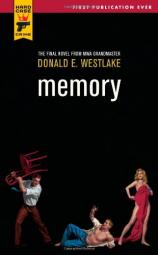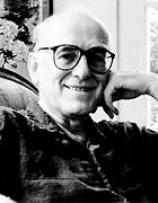Memory
Review
Memory
MEMORY is one of the best books of 2010, despite the fact that it was first written almost half a century ago and has never been published before. It is the final book by the late great Donald E. Westlake, who passed away on New Year’s Eve 2008. And as sad as that last sentence is for those of us who loved his work, MEMORY might just stand among the best novels of his brilliant career. It is pure noir writing at its best. Nobody knows exactly when Westlake wrote it, but it lay almost forgotten among his papers for decades.
Lawrence Block, Westlake’s friend and fellow mystery author, picks up the tale: “Don's agent tried his damnedest to sell it back in the day. But it was a long serious novel by a young unknown, and no end of publishers thought the world of it but felt they couldn't publish it successfully. Then some years later --- early 80's, maybe --- the agent in question said he probably could sell MEMORY now, and Don decided its time had passed, that it was too dated. I thought of it when I was writing a memorial piece for Mystery Writers of America and [Westlake’s wife] Abby, who'd never heard of it, came across a battered carbon copy shortly thereafter.” Block brought the manuscript to Charles Ardai, founder and editor of Hard Case Crime Books, and MEMORY had finally found its home. “I'd like to think Don would be glad it's finally getting into print,” Block says, “but for all I know he'd hate the idea.”
MEMORY is a masterpiece, a book that grabs you on the first page and does not let go. Westlake is remembered for the comic caper novels involving the hapless burglar John Dortmunder. But he could write hard-boiled noir with the all-time greats of that genre, as he proved in books like THE AX or the great series of novels involving the immoral Parker, which he wrote under the pseudonym Richard Stark. MEMORY reaches beyond noir, if possible, to the existential work of writers like Kafka. It asks the questions: What if you lost who you are almost completely? What if you lost not just your memory, but every part of the life you once held dear? Even worse, we all operate under the comforting assumption that we have a safety net of family, friends and associates to love and protect us always. But do we? What if that is nothing more than an illusion?
The novel begins solemnly: “After the show, they went back to the hotel room, and to bed, for the seventeenth time in three weeks.” The "they" in question is Paul Cole, a 26-year-old actor in a road company show, and although we never learn his partner’s name, he does inform us that she is married. In the second paragraph, their interlude is interrupted by the woman’s husband, who proceeds to hit Cole over the head with a chair. He wakes up 56 hours later in a hospital. A nurse tells him, “And now you are awake again, and just as fine as new.”
Not quite. Cole’s descent into the darkness has just begun. In noir, once the descent begins, the protagonist, no matter how innocent or guilty, is trapped and his destiny sealed. All we the audience can do is watch him twist and struggle against his fate. Cole keeps trying to remember what happened before the attack to no avail: “The fog was too persistent, it was more like syrup poured into his head, sticking to everything, obscuring all the outlines, like the paint muffling the lines of the moldings in the room, but more softly and cloyingly.”
He gets, for lack of a better term, the bum’s rush out of the hospital after just 13 days. And this is clearly not a medical community that believes in socialized medicine since the not-so-kindly doctor relieves him of all but $16.84 of his last acting check to pay for his hospital bill, his troupe having long since moved on to the next town. What’s worse, a local cop has it in for him and treats him like he committed the crime of the century. The cop deposits him at the bus station, despite the fact that Cole does not have enough money for a ticket home to New York City. He is alone to face his destiny.
So he ends up in a nearby town, working in a tannery, trying to remember and save enough money to get home. Thirty years before it was done in the 2000 movie Memento, Westlake has Cole obsessively writing notes to himself and plastering them on the walls of his room to remember the simplest things, like when to go to work. Westlake writes, “When he looked at his wrist, after putting the pen and pad away, he had a sudden feeling of dread, because his watch was gone. It was dread for more than the loss of a watch; he could lose everything, be reduced to nothingness, and he was helpless.” That is noir.
But he keeps fighting, trying to recover and remember. Eventually, he gets back to New York, but rather than salvation, it brings him to an entirely new circle of hell. He gets glimpses from friends and acquaintances of his old life, and still his memory won’t clear. He plays his old records but doesn’t even like the music and wonders about the man who once did. People he once knew and loved look at him with “pity, impatience and disgust.” A former teacher tells him, “You were sure of yourself, proud of yourself.” He tries to act again but can’t. He is haunted at night by strange dreams and in the day by a black depression. His girlfriend rejects him and his agent dumps him. Westlake writes, “It was all going, all crumbling away like an island being swallowed by the sea, eroding like the river banks in the spring flood.”
MEMORY builds and builds and keeps us guessing until the final page. We come to like Paul Cole and root for him as we follow him down. This is not just a great thriller; it’s a great novel. Those of us who have loved Westlake’s books over the years owe a debt of gratitude to Lawrence Block for remembering this work and Charles Ardai and Hard Case Crime for publishing it. Hard Case proves yet again why it is the most invaluable and creative publishing house in the United States today. America’s rich literary history needs books like this one to be in print.
MEMORY is an unforgettable final gift from one of America’s greatest writers. Enjoy it. And wonder perhaps about the darkness that lurks just outside the self-imagined halo of our everyday lives.
Reviewed by Tom Callahan on January 7, 2011





